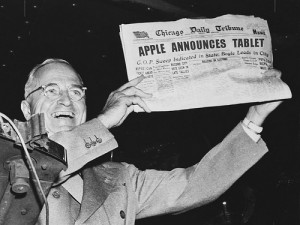 Journalisted is an independent, not-for-profit website built to make it easier for you, the public, to find out more about journalists and what they write about. It is run by the Media Standards Trust, a registered charity set up to foster high standards in news on behalf of the public, and funded by donations from charitable foundations. Each week Journalisted produces a summary of the most covered news stories, most active journalists and those topics falling off the news agenda, using its database of UK journalists and news sources.
Journalisted is an independent, not-for-profit website built to make it easier for you, the public, to find out more about journalists and what they write about. It is run by the Media Standards Trust, a registered charity set up to foster high standards in news on behalf of the public, and funded by donations from charitable foundations. Each week Journalisted produces a summary of the most covered news stories, most active journalists and those topics falling off the news agenda, using its database of UK journalists and news sources.
Gaddafi, Hurricane Irene, Steve Jobs & GCSEs
- The liberation of Libya and search for Colonel Gaddafi was this week’s lead story
- Hurricane Irene, Steve Jobs’ resignation and GCSE results covered lots
- Strikes in Chile and Pukkelpop stage collapse covered little
Covered lots
- The fall of Libya, and subsequent search for Colonel Gaddafi, as rebels took control of the capital Tripoli, 782 articles
- America battened down the hatches in preparation for Hurricane Irene, 238 articles
- Steve Jobs resigned as CEO of Apple due to ill health, 161 articles
- GCSE results announced, 160 articles
Covered little
- Violent clashes during Chile’s national strike, 11 articles
- Canadian opposition leader Jack Layton dies aged 61, 10 articles
- Bolton man dies after being Tasered, the third death following an arrest in 8 days, 9 articles
- 5 people die at Belgian music festival Pukkelpop as weather conditions cause stage collapse, 5 articles
- Cyprus’ financial problems continue, as the government debates an emergency fiscal package, 3 articles
Political ups and downs (top ten by number of articles)
- David Cameron: 416 articles (-23% on last week)
- Nick Clegg: 143 articles (+32% on last week)
- Tony Blair: 138 articles (+86% on last week)
- William Hague: 123 articles (+515% on last week)
- George Osborne: 94 articles (-53% on last week)
- Liam Fox: 82 articles (+356% on last week)
- Theresa May: 71 articles (-53% on last week)
- Andrew Mitchell: 67 articles (+379% on last week)
- Gordon Brown: 54 articles (-26% on last week)
- Alex Salmond: 53 articles (-32% on last week)
Celebrity vs. serious
- Will Smith and Jada Pinkett deny marriage split rumours, 21 articles vs. Mexican casino arson attack kills 53, 20 articles
- Amanda Holden announces pregnancy, 20 articles vs. Israel and Hamas agree to a Gaza ceasefire after 5 days of violence, 15 articles
- Tracey Emin’s neon artwork installed at 10 Downing Street, 12 articles vs. Syrian political cartoonist has both hands broken and is left for dead following his kidnap, 10 articles
Arab spring (countries & current leaders)
- Libya’s National Transitional Council: 354 articles (+622% on previous week)
- Syria and President Assad: 84 articles (-17% on previous week)
- Gaza and Hamas: 29 articles (-31% on previous week)
- Israel and Prime Minister Netanyahu: 7 articles (-68% on previous week)
- Qatar and Sheikh Hamad bin Khalifa Al Thani: 7 articles (up from 0 in previous week)
- Yemen and President Saleh: 5 articles (+25 on previous week)
- Egypt’s Military Council: 5 articles (-38% on previous week)
- Turkey and Prime Minister Erdogan: 3 articles (-82% on previous week)
- West Bank and President Abbas: 3 articles (+50% on previous week)
- Saudi Arabia and King Abdullah: 2 articles (+0% on previous week)
- Algeria and President Bouteflika: 2 articles (up from 0 in previous week)
- Iraq and Prime Minister Maliki: 1 article (-80% on previous week)
- Morocco and King Mohammed: 1 article (up from 0 in previous week)
- United Arab Emirates and President Al Nahyan: 1 article (+0 on previous week)
Who wrote a lot about… former News of the World editor Andy Coulson
- Polly Curtis – 5 articles (The Guardian)
- James Robinson – 3 articles (The Guardian)
- Andrew Sparrow – 2 articles (The Guardian)
- Jason Groves – 2 articles (MailOnline)
- Christopher Hope – 2 articles (Daily Telegraph)
- Caroline Binham – 2 articles (Financial Times)
Long form journalism
- 5,144 words: ‘How to make an intelligent blockbuster and not alienate people’ – Mark Kermode, The Observer 28 August, 2011
- 4,492 words: ‘Inside Warren Jeffs’ cult of evil: a survivor’s story’ (£) – Tim Teeman, The Times, 27 August 2011
- 3,890 words: ‘Get out of New York: Residents told to flee as Hurricane Irene moves closer’ – Daniel Bates, MailOnline 26 August 2011
Journalists who have updated their profile
- Tom McArthur is currently an online producer at ITN as well as writing for Sabotage Times. He has formerly written for Pale Blue News and Under the Influence Magazine, before which he interned for Ultimate Rugby 7s website and completed work experience at the Independent on Sunday. He read European & International Politics at Northumbria University, and is a former winner of Vice Chancellors Community Sports Award. You can follow Tom on Twitter @TomMcArthur
- David Wooding was associate Editor (Politics) at News of the World, a position he held from 2010 until the paper’s closure in July. Prior to NoW he worked at The Sun, The People, Daily Mail and Daily Express. He studied at the University of Lancashire and is a former winner of the News Reporter of the Year award. You can follow David on Twitter @DavidWooding
Read about our campaign for the full exposure of phone hacking and other illegal forms of intrusion at the Hacked Off website
Visit the Media Standards Trust’s Churnalism.com – a public service for distinguishing journalism from churnalism
The Media Standards Trust’s unofficial database of PCC complaints is available for browsing at www.complaints.pccwatch.co.uk
For the latest instalment of Tobias Grubbe, journalisted’s 18th century jobbing journalist, go to journalisted.com/tobias-grubbe





![Reblog this post [with Zemanta]](https://img.zemanta.com/reblog_e.png?x-id=59ce27b8-13a6-43ae-b691-89cbf8a3bfb8)


